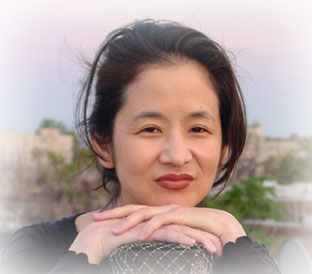The novelist, whose new book is ''The Swimmers,'' likes to read and write in cafes with other solitary types, ''all engaged in an adult form of parallel play, quietly feeding off each other's energy."
.- What books are on your night stand?
''Visitation,'' by Jenny Erpenbeck. ''Open Water,'' by Caleb Azumah Nelson. ''Severance,'' by Ling Ma. ''Real Estate : A Living Autobiography,'' by Deborah Levy. ''The Shapeless Unease : A Year of Not Sleeping,'' by Samantha Harvey. ''Festival Days,'' by JoAnn Beard. ''Leave the World Behind,'' by Rumaan Alam.
.- Describe your ideal reading experience [ when, what, where, how ]
Like many writers, I'm a very solitary person, but I love reading and working in public spaces. My ideal reading experience : late afternoon, pre-pandemic, my neighborhood cafe, a seat in the far back corner, a slight coffee buzz. All around me, the pleasant hum of human voices.
In front of me, on the table, a book, a pencil for underlining [ Blackwing Palomino ], a pen and a small unlined Muji notebook, in case a run across a sentence I want to write down, or overhear a good snatch of dialogue [which could end up in my next novel - sometimes I only appear to be reading].
At the next table over sits a favorite fellow regular, deeply engrossed in a similarly personal project : composing a piece of music, fixing a line of computer code, writing a poem, a screenplay, a novel. We're all engaged in an adult form of parallel play, quietly feeding off each other's energy, alone but not alone.
.- Do you count any books as guilty pleasures?
I'm reading one right now - ''The Anomaly,'' by the French author Herve Le Tellier, about a mysterious plane flight whose passengers seem to exist in two different realities. It's very '' Black Mirror.'' I'm sure what makes a book a guilty pleasure, but you definitely know it when you're reading one.
.- How do you organize your books?
Fiction and poetry, alphabetically. I also have several shelves of books about Japanese Americans and World War II, with no organizing principle at all. And another couple shelves of books about swimming and dementia and illness.
My top shelves are for ''short'' books of all genres, and then there's a shelf set aside for books that I'm currently reading. A half-shelf for library books, so I don't forget where they are.
And a shelf devoted to some of my favorite painters, among them Giorgio Morandi, Joan Mitchell and Richard Diebenkorn. I could look at paintings all day long. That's my true guilty pleasure.
.- What book might people be surprised to find on your shelves?
''Report of the Commissioner of Agriculture for the Year 1866.''
.- What kind of reader were you when you were a child? Which childhood books and authors stick with you most?
In junior high, I was very into the short stories of Ray Bradbury and Harlan Ellison. Then, in high school, it was Carlos Castaneda, which I now find totally embarrassing. That crow, I also loved Hermann Hesse - ''Siddhartha,'' ''The Glass Bead Game.'' And I read - of course. ''Be Here Now,'' by Ram Dass.
This was the mid-70s, and the '60s were still very much in the air. I felt like I was 10 years too late to the party. Somewhere inside me still, there's a secret hippie yearning to get out.
.- You're organizing a literary dinner party. Which three writers, dead or alive, do you invite?
Franz Kafka, Emily Dickinson. Thomas Bernhard.
.- What do you plan to read next?
Yoko Ogawa's ''The Memory of Police.'' I first ran across her work in an eerie short story published in The New Yorker in 2005, titled ''Pregnancy Diary,'' whose disturbed narrator keeps a diary of her sister's pregnancy.
Since then, I've gone on to read three more of Ogawa's books : '' The Diving Pool '' [ a collection of novellas, including '' Pregnancy Diary '' ], ''The Housekeeper and the Professor'' and ''Hotel Iris.''
Ogawa is a master of quiet dread and I'm eager to read her latest book, set on an unnamed island where entire categories of objects are suddenly '' disappeared '' from both the physical world the memories of its inhabitants, who are under constant surveillance by the government.
It's my gift to myself for finishing '' The Swimmers. ''
The World Students Society thanks The New York Times.

.png)


0 comments:
Post a Comment
Grace A Comment!